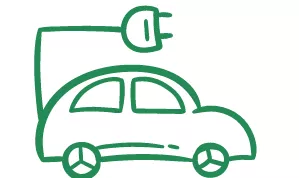Electric Vehicles Are Really Greener Than Gas-Powered Vehicles
August 8, 2023

Cars, trucks, and other modes of transportation that are gas-fueled are the major source of climate pollution in the U.S. and many other countries. For that reason, the Biden administration, the European Union, and authorities around the world are proposing and enacting policies to convert transportation to electric vehicles (EVs). The proposal in the U.S. is to have all new vehicle sales electric-powered by 2030. Yet, there is a persistent belief that EVs are in fact not better for the environment than fossil fuel-powered cars and trucks and that mining for minerals needed for the manufacture of EV batteries is associated with human rights violations. Are these claims true, or do they represent misinformation?
There are basically two challenges to the claim that EVs are better for the environment than gas-powered cars and trucks. The first is that since the electric grid is still powered by coal and natural gas to varying extents in different parts of the world, powering up an EV is essentially utilizing an energy source that is based on fossil fuels. The second is the claim that the process of manufacturing an EV utilizes more energy than manufacturing a fossil fuel-powered vehicle.
EVs Emit Lower Amounts of Greenhouse Gasses
According to the Union of Concerned Scientists, “Even when the electricity used to fuel an EV comes from the dirtiest coal-dominated grid in the U.S., EVs still produce less global warming pollution than their conventional counterparts.” Right now, the Union estimates that on average an EV is responsible for greenhouse gas emissions equivalent to a conventional car that gets 73 miles per gallon. This will get even better as the electric grid is further decarbonized by the introduction of more solar and wind power.
It is important to also remember that electric vehicles do not have tailpipes and therefore do not return toxic gasses into the environment. Those tailpipe emissions from conventional cars are responsible for the massive air pollution that we now know is associated with increased risk for a wide range of serious adverse medical outcomes, like lung and heart disease and dementia.
Battery Production Requires Energy
It is true that the manufacturing process of batteries for EVs requires a significant amount of energy, and this can be greater than energy requirements to manufacture a gas-powered car or truck. This fact has also been used to assert that EVs are not in fact better for the environment than conventional vehicles.
Once again, however, looking at the big picture shows that overall, even with the manufacturing process considered, EVs are greener than conventional vehicles. According to the U.S. Environmental Protection Agency (EPA), “over the lifetime of the vehicle, total GHG [greenhouse gas] emissions associated with manufacturing, charging, and driving an EV are typically lower than the total GHGs associated with a gasoline car.” This also will get even better as we move increasingly to recycling EV batteries, decreasing the need to manufacture new ones.
By every possible measure, then, EVs are clearly already greener than fossil fuel powered vehicles and the gap will only get larger as the electric grid is decarbonized and more battery recycling occurs.
Human Rights Violations Associated with Mining Are Deeply Concerning
The human rights violations that have been reported in association with mining of minerals like lithium and cobalt that are needed for EV batteries are not so easily dismissed. As noted by two climate reporters for the New York Times:
…as much as 70 percent of the world’s cobalt supply is mined in the Democratic Republic of Congo, a substantial proportion in unregulated “artisanal” mines where workers — including many children — dig the metal from the earth using only hand tools at great risk to their health and safety, human rights groups warn.
Similar issues have been raised about lithium mining, which occurs mainly in Australia and the Andean regions of South America. Mining of minerals used to manufacture EV batteries has also been associated with contamination of local water supplies and release of toxic fumes. The European Union has proposed regulations that would require car manufacturers to identify and work to eliminate human rights violations in the sourcing of minerals for EV batteries. The non-profit organization Human Rights Watch advocates for strong regulations by all countries involved in EV battery manufacturing:
Car companies should be required to map and disclose the mines and refineries in their supply chain, conduct and review rigorous third-party assessments of mines and refineries’ respect for human rights and the environment, and ensure that they take corrective action to respond to abuses.
Of course, mining of minerals like cobalt and lithium preceded the demand for these minerals in EV battery manufacturing, so human rights violations and environmental damage cannot be blamed solely on car manufacturers. Nevertheless, it would be hypocritical to call a vehicle “environmentally friendly” if some of its components are made utilizing child labor or by contaminating a local water supply. According to reports, EV manufacturers are now scurrying to identify these issues and to develop mineral supply chains that do not involve such risks. Once again, recycling of EV batteries will obviate some of these problems as there will be less need to mine new minerals. Still, concerns over how minerals for EV batteries are mined are important and pressure must be put on EV manufacturers to trace exactly how minerals used in batteries are mined and develop remediation steps to ensure the process does not involve human rights violations or environmental damage.
Other Worries Linger
Many people are concerned that a substantial increase in EVs will overtax the electric grid and lead to power outages, especially in warm climates and months when air conditioning is used. One hopeful sign comes from Norway, where in 2022, 80 percent of new-car sales were for EVs, but there was no reported strain on the electric grid. The air in Norway’s capital, Oslo, is reportedly now much cleaner and gas emissions “have fallen 30 percent since 2009.” All of this has been accomplished without causing significant unemployment among gas station workers and new jobs have been created to support the burgeoning EV market.
Of course, Norway is a northern latitude country where air conditioning demand is almost certainly less than needed in warmer climates. It is also a small country with a population of only about 5.5 million people. Hence, how the Norway situation will translate to larger, warmer countries, like the U.S., is unclear. The U.S. electric grid is beleaguered by a mass of regional companies and state and local regulations that make upgrading and extending solar- and wind-generated power long distances via high power transmission lines very difficult. Still, the Norway experience suggests that it is possible to accomplish the switch to EVs without collapsing the electric grid. Dealing with the antiquated electric grid situation in the U.S. is urgently needed if we are to copy the Norway example, especially given our need to substantially increase the number of charging stations available for EVs.
The U.S., the European Union, and many other countries around the world are moving inexorably to replacing gas- and diesel-power cars and trucks with EVs. Experts agree that this will lead to a substantial reduction in greenhouse gas emissions and cleaner air, benefits that will only increase as the electric grid is decarbonized and more battery recycling is initiated. Hopefully, manufacturers will also heed the calls for effective tracing of sources of minerals used in EV batteries so that human rights violations can be eliminated and environmental damage from mining controlled. The U.S. will need to speed efforts to upgrade its electric grid to accommodate the increased need for electric power to charge EVs.
Most of the criticism of EVs today comes from sources that profit from gas-powered engines, like fossil fuel companies. We need to look past the many myths they generate about EVs and recognize that they are clearly better for the environment than conventional vehicles and will only become more so. At the same time, we need to advocate strongly for improvements and regulations that will make EVs truly sustainable and ethical.
Related Posts

The Glaciers Are Melting...Very Fast
Posted in climate change
We have been amply warned about climate change. What should we be doing now to make a difference?